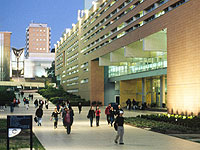|
|||||||||||||||||||||||||||||||||||||||||
| Art, Gender, Sexuality and the Body - SAHT2642 | |||||||||||||||||||||||||||||||||||||||||

Description This course concentrates on art after 1960 which deals with issues of gender, sexuality and the body. The course will start with postminimalism, performance and body art. It examines the rise of women's art in the 1960s and 70s, the first art to self-consciously attempt to represent gender difference, and will track the shifting concerns and debates in art about the body, gender and sexuality from then until now. This period coincides with an explosion of feminist theory and the widening of feminist debates to include questions of sexuality, race and ethnicity. The course will explore the particular ways in which these debates are refracted through art practice and art history. Key questions to be explored in the course include: Is there a feminine aesthetic? Is the depiction of the body linked to essentialism? Is masculinity the new dark continent? How can the body be used as an expressive medium? How does art practice relate to both identity formation and fantasy? Topics to be covered include: the rise of body art; performance and masochism; identity and essentialism; postmodern irony; female and male masquerade; queer and gay art; and the rise of bad girl and bad boy art in the 1990s.
|
|||||||||||||||||||||||||||||||||||||||||


